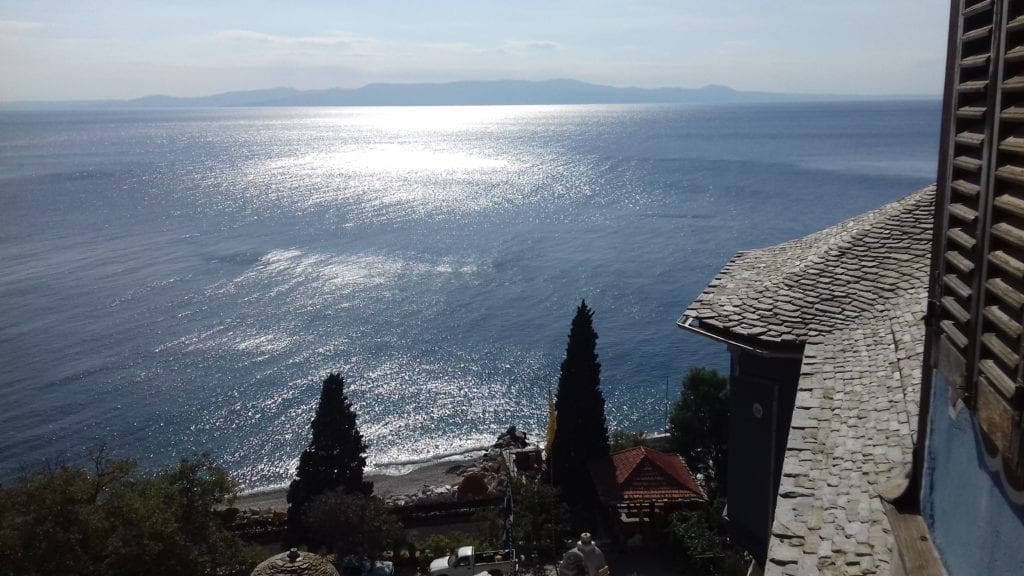Anthony Papagiannis
Thessaloniki, Greece
 |
| Quicksilver in blue. Photo by Anthony Papagiannis. |
Doctor-patient relationships are as unique as the potential pairs of doctors and patients. At one end of the spectrum there is the one-time encounter, usually for some straightforward and self-limiting problem: the doctor may never see the patient again. At the other extreme, a lifelong bondage of chronic conditions may bring the patient back time and again. There are many variations in between. The impact of the relationship may vary with the severity or peculiarity of the problem or the particular circumstances under which it developed, but not necessarily with the duration of the relationship. Even brief encounters can be poignant and memorable.
***
One October evening some years ago I received an alarming e-mail: people do not often use their own name in the subject line. Dorothy’s son had the sad duty of informing all her contacts that his mother had passed away suddenly that morning.
I had first met Dorothy as a patient fourteen years earlier when she was on summer vacation in Greece from Britain. A chronic heavy smoker, she had been admitted in respiratory failure from an exacerbation of her severe obstructive lung disease. She was palpably relieved to communicate in her own language with a doctor who had lived in her home city of Manchester. She recovered, and after a few days was able to fly back to England with her husband, leaving her smoking habit permanently behind. Ever since she would e-mail me regularly with news about her family, her visits to the hospital or general practitioner, her joys and sorrows. She would ask for advice and I would try to provide answers and overall encouragement from a safe distance.
We met once again when I found myself in Manchester for a medical meeting. She was overjoyed at our reunion, and our regular correspondence continued afterwards. She kept closer contact than many of my local patients. Her last message was in July when she wrote to say that she would turn seventy-nine in a few days. Now, six years later, I still miss her messages.
***
Peter emigrated to Australia more than half a century ago. He worked hard and did well, had children and grandchildren, and in his retirement returned for a long vacation in his homeland. After two months of travelling around Crete, the Peloponnese, and some of the Aegean islands, he started to feel breathless. Within a couple of weeks his breathing forced him to seek medical attention, and there our paths crossed. He told me about the burgeoning Greek community of Melbourne with its forty-two churches and equal number of Greek schools, and was particularly proud that all his family spoke perfect Greek. Indeed, despite his long stay abroad neither he nor his wife had a trace of foreign accent.
Unfortunately things did not look good from a medical point of view. One side of his chest was dull to percussion and completely white on X-ray. Repeated taps produced four liters of fluid teeming with cancer cells. Bronchoscopy confirmed the presence of an advanced lung tumor. I had to share this nasty surprise in the midst of his homecoming, and we made arrangements for his precarious flight back to Australia so that he could have treatment close to his family. On the day of his departure we hugged in tears, knowing in our hearts that we would never meet again in this world.
For five days I waited anxiously for news, as his breathing had been worsening rapidly. Finally a text message announced that he had barely survived the flight, and had been taken directly to the hospital by ambulance. I breathed a sigh of relief, hoping that he could gain some valuable time. It was not to be: a late Christmas card from his daughter brought me the news that he had never been able to start treatment. His disease was aggressive, and he died within a month of his return.
***
These two cases resurfaced in my memory as I was once more involved in the care of a patient from abroad with respiratory problems. Fortunately he proved to be a “Dorothy” and not a “Peter,” and his messages from home have been quite reassuring. I am looking forward to seeing him on his next visit to Greece. It is not a matter for boasting, but it is encouraging to know that every so often even a brief encounter can have a life-changing effect on our patients.
ANTHONY PAPAGIANNIS, MD, MRCP(UK), DipPallMed, FCCP, is a practicing pulmonologist in Thessaloniki, Greece. He graduated from the Aristotle University of Thessaloniki Medical School. He trained in Internal Medicine in Greece and subsequently in the United Kingdom, and specialized in Pulmonary Medicine. He also holds a postgraduate Diploma in Palliative Medicine from the University of Cardiff, Wales, United Kingdom. He is a postgraduate instructor in palliative medicine in the University of Thessaly, Larissa, Greece. He also edits the journal of the Thessaloniki Medical Association, and blogs regularly.
Fall 2019 | Sections | Personal Narratives

Leave a Reply